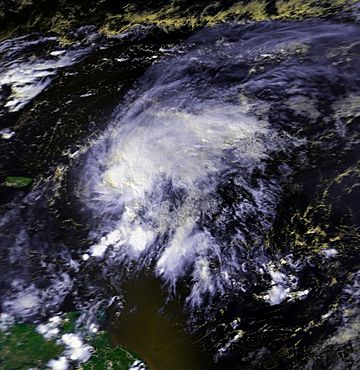Hurricane Klaus facts for kids
| Category 1 hurricane (SSHWS/NWS) | |

Hurricane Klaus at the it highest wind speeds
|
|
| Formed | October 3, 1990 |
|---|---|
| Dissipated | October 9, 1990 |
| Highest winds | 1-minute sustained: 80 mph (130 km/h) |
| Lowest pressure | 985 mbar (hPa); 29.09 inHg |
| Fatalities | 11 direct |
| Damage | > $1 million (1990 USD) |
| Areas affected | Lesser Antilles, The Bahamas, Southeast United States |
| Part of the 1990 Atlantic hurricane season | |
Hurricane Klaus was a hurricane that formed in October 1990. It was not a very strong storm. Klaus moved close to islands like Antigua and Martinique. Even though it was weak, it still caused problems.
The storm's leftover parts later moved over the southeastern United States. There, they combined with another storm called Tropical Storm Marco. This caused heavy rain and flooding. Hurricane Klaus caused about $1 million in damage. Sadly, 11 people lost their lives because of this storm.
Contents
Why Was Hurricane Klaus Important?
Hurricane Klaus was part of the 1990 Atlantic hurricane season. It showed how even weaker hurricanes can still cause damage. It also showed how storms can combine to create more problems.
Klaus's Journey and Impact
Hurricane Klaus started forming on October 3, 1990. It became a hurricane as it moved across the Atlantic Ocean. The storm passed very close to several islands. These included places in the Lesser Antilles.
The islands of Antigua and Martinique felt the storm's effects the most. Klaus brought strong winds and heavy rain. This led to some flooding and damage to buildings. After passing the islands, Klaus began to weaken.
How Klaus Affected the United States
Even after Klaus weakened, its moisture moved north. It reached the southeastern United States. There, it met up with Tropical Storm Marco. The two storm systems together caused a lot of rain.
This heavy rainfall led to floods in parts of the US. Four people died in the United States due to these floods. This shows that even the remains of a hurricane can be dangerous.
Why Was the Name Klaus Retired?
Sometimes, a hurricane causes so much damage or loss of life that its name is "retired." This means the name will not be used again for another storm. It helps remember the impact of that specific storm.
The Decision to Retire Klaus
In the spring of 1991, France asked for the name Klaus to be retired. This was because of the damage it caused in Martinique. Martinique is a French island in the Caribbean.
The National Hurricane Center agreed to retire the name Klaus. This means no future Atlantic hurricane will ever be called Klaus. It's a way to honor those affected by the storm.
What Name Was Used Instead?
When a name is retired, a new name takes its place on the list. For Klaus, the name Kyle was chosen. The name Kyle has been used for hurricanes in 1996, 2002, and 2008.
 | Charles R. Drew |
 | Benjamin Banneker |
 | Jane C. Wright |
 | Roger Arliner Young |

